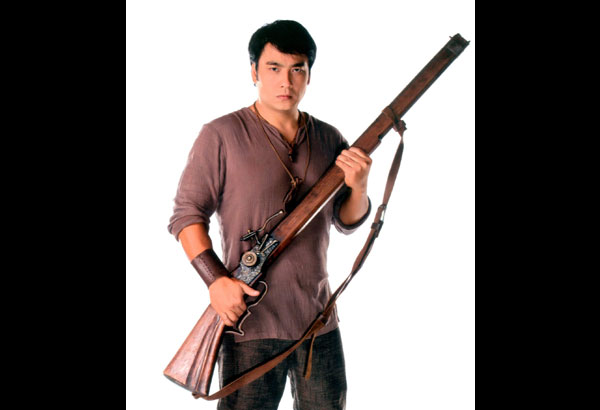
The results are in from Funeralwise.com’s Fall 2012 TV Body Count Study: TV is more violent and bloody than ever. How does violence on TV stack up in other parts of the world?
Digital Dying decided to take a look…
Philippines – TV is booming in the Philippines. In Juan dela Cruz, a teledrama that premiered earlier this week, Juan is the last in a line of guardian angels. His mother died giving birth to him while his father, unbeknownst to him, is a shape-shifting vampire. Juan falls in love with Rosario, an undercover vampire hunter he meets on his journey to retrieve a stolen “Cross of Steel” his mother left him that has the ability to transform into different weapons. In Indio, a historical drama that premiered last month, a boy named Malaya, son of Ynaguiguinid, the goddess of war, is born with superhuman strength that increases steadily as he grows up. But an unfortunate turn of events finds him under the custody of an evil governor named General Juancho. When Malaya finds out the General is a cruel ruler he revolts, setting forth on an epic and bloody mission: to oust the evil Spanish conquistadors.
Other Great Reads: Funeral practices around the world
“Are we more violent as a society today?” wondered a columnist in a 2010 article in the Inquirer Global Nation, a Filipino newspaper. “Do video games subliminally brain-wash our young children’s minds as they take pleasure in actively participating in virtual massive killings as an accepted form of entertainment?” The writer goes on to discuss studies that show that violent TV increases aggression and enhances the risk a child will abuse their spouse and commit crimes as an adult. Violent crime becomes an acceptable social behavior, states the article. An essay on the webpage of the Philippines National Commission for Culture and the Arts points out that children look to TV and other media for authority figures. When that media is violent, this spells trouble. “A worrisome trend in children’s television worldwide is the rise of popular cartoons with sinister combat violence,” the essay states. One can only imagine that trend will continue.
Australia – Like Americans, Australians love their guns. And like Americans, their TV shows are loaded with them. The Australian show Underbelly is a 13-part TV mini-series based on the real life events of a mafia war that occurred on the streets of Melbourne from 1995 to 2004. The story followed actual events so closely that a court injunction prevented much of it from being aired in the province of Victoria, where the city of Melbourne is located. An overview of the show reads as follows: “Alphonse Gangitano, the self-styled ‘Black Prince of Lygon Street’, kills a man at a party over a small debt and, with Jason’s assistance, injures 13 innocent people. During his trial, Gangitano is murdered by Jason, although the killing goes unsolved. The Moran brothers buy a pill press and employ Carl Williams to produce their drugs. Carl secretly begins making his own supply and forms an alliance with Moran rival Tony Mokbel. When Carl is busted by the police, Jason discovers his double-cross and shoots him in the stomach.”
Other Great Reads: Australia’s favorite cop killer will finally be properly buried, 130 years later
Underbelly has broken numerous ratings records but the show also has its critics. According to a 2010 news story, Australian television features more than 20 hours of shows containing violent crimes a week. “At a time violent crime is on the rise in Australia’s capital cities, some are asking why the level of brutal, bloody content on our TV screens has largely escaped scrutiny,” states the article. In 2009, the Australian Family Association called Underbelly “pornography that glamourized violence” and said the show was inappropriate for an 8.30 pm time slot. A notable Australian psychologist pointed out that violence on TV “desensitizes us to the impact violence has in real life and makes us think we can get away with the crimes that we see on TV.” And what about TV violence that’s based on real life violence then influencing how people act in real life?
In 2010, Carl Williams, the legendary Melbourne crime figure on which the Underbelly series was based, was killed by inmates while walking across a prison exercise yard. He was serving a life sentence for murder in a maximum security prison. The weapon, according to detectives, was the stem of an exercise bike. Williams suffered head injuries and went into cardiac arrest, he died at the scene. When interviewed on the murder, Andrew Rule, co-author of the series of books the show was adapted from pondered just what it meant for the ongoing crime saga. “You would have to wonder who benefits from this death?” said Rule. “Did someone fear that he was going to give evidence or information? Was it punishment for already having given some sort of information?”
Smells like another season to me.










Ebi@funeral flowers putney
Hi Justin, i am really liking your topics 🙂
The thing is we need to take a few things into account, for example we as particular generation experience a certain level of extreme violence. As time goes on a younger generation are born into that and from young ages they become used to the visuals and experience, so for them as they mature and grow these scenes are violent but not shockingly violent, so in order to create shocking cinema/new violent experience which sell’s in social society the only way to achieve this is to enhance the level whether it be media based or not. The only thing i see moderating this is the like of the film and visual classifications companies such as the BBFC, they wont allow certain amount of violence or blood onscreen, this also encourages curiosity to watch banned/violent TV/Cinema, knowing that “Irréversible” Director: Gaspar Noé (French cinema) was banned made me watch it!
Justin Nobel
These are fantastic points! Apologies for not getting back to this fascinating comment sooner. I agree, in a way we only have ourselves to look to for the source of this problem. The nightly news is gory because people turn on the nightly news, if no one watched it the broadcasters would surely run other stories. Same goes for TV shows etc. I personally think we are in middle times, yes we are of the current era, and we seem so utterly advanced compared to 100 and even 10 years ago, but we are still really just bumbling around, we are violent and carnal and hold many of the same attributes of the animals we came from. But we are evolving, humans are moving beyond. If we are to survive at all on this planet then it will be by becoming less violent, less animalistic, more human, more humane. Humans of the future will look back on the times we’re currently living and think, what beasts!